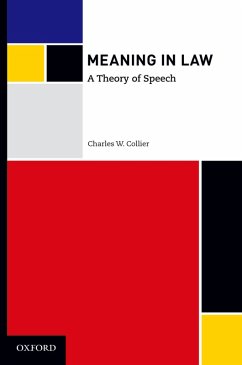Despite widespread admiration for the First Amendment's protection of speech, this iconic feature of American legal thought has never been adequately theorized. Existing theories of speech proceed on the basis of legal doctrine and judicial decisionmaking, social and political philosophy, or legal and intellectual history. But these are not the disciplines one would most naturally turn to in analyzing speech. Meaning in Law: A Theory of Speech takes a new and different approach. This book develops a general legal theory of speech on the basis of linguistic theory and the philosophy of language. The opening chapters retrace the main conceptual stages in the expression of meaning: from natural meaning, through symbolism, to signification. Later chapters analyze symbolic speech (communication by nonlinguistic means) as the key to developing an intention-based theory of speech. The essential elements of the theory are (1) nonnatural meaning, (2) the signaling of intent, (3) the recognition of intent, and (4) establishing a convention. A final chapter applies these insights to the case law of symbolic speech and resolves some basic confusions in the legal literature. This analysis proceeds by way of an original distinction between actual conduct (in the real world) and the "ideal conduct" described in a statute. The former may be described both as communicative and noncommunicative, while the latter has already been conceptualized as either communicative or noncommunicative. This distinction clears up a major legal quandary: how conduct that counts as communication may nevertheless be regulated or prohibited, without running afoul of the First Amendment's protection of speech.
Dieser Download kann aus rechtlichen Gründen nur mit Rechnungsadresse in A, B, BG, CY, CZ, D, DK, EW, E, FIN, F, GR, HR, H, IRL, I, LT, L, LR, M, NL, PL, P, R, S, SLO, SK ausgeliefert werden.


